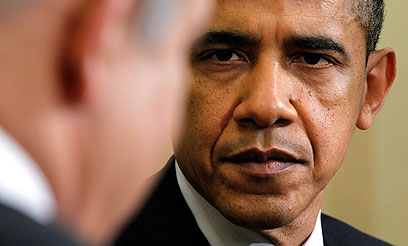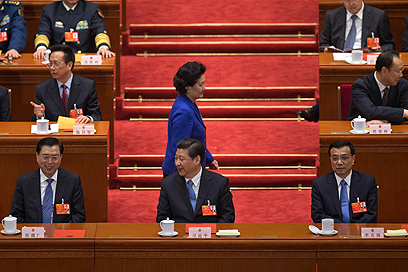Obama will talk to Bibi, but think of China
Analysis: US president's upcoming visit meant to incorporate Israel into Washington's new global strategy
US President Barack Obama has two good reasons to visit Israel and the Palestinian Authority at this time. He recently formulated a new global strategy, and he is very interested in incorporating Israel into it and making the Jewish state an active partner in achieving its goals. The second reason is that Obama and the senior members of the Democratic Party want to the correct the mistake the president made during his first term, when he visited Muslim countries in the Middle East but bypassed Israel and its citizens in an insulting way.
Israel also has an interest in accepting the American president's suggestions and greeting him with warmth and enthusiasm that will erase past disputes. The first consideration is related to diplomacy, security and the great importance of an alliance with a global superpower. There have been disagreements between Jerusalem and Washington on numerous occasions in the past, but Israel's prime ministers have always made certain that the basic alliance with the US would not be harmed (as opposed to the strategic alliances Israel used to have with Britain and France). Moreover, we have always tried to prove that Israel is not merely a "client" of the superpower that protects it, but a partner that has strategic value.
From an emotional aspect, Israel's political establishment and its citizens have an interest in improving relations with the Obama administration. We must keep in mind that Benjamin Netanyahu's intervention in the US elections in favor of the Democrats' bitter rivals was no less scandalous than Obama's decision not to visit Israel on his first tour of the Middle East as president. Jerusalem and Washington will have to make some fateful decisions over the next two years, so the thought process should be clear and devoid of any irrelevant considerations.
America's new global strategy was devised to maintain its status as the leading economic and military force amid the changes the world has seen over the past few years and despite the economic crisis the US is experiencing.
The change in Washington's strategic direction stemmed mainly from the competition with China in nearly every field – not only with regards to the military and the economy. Washington is mainly concerned by China's persistent effort to recruit the South Asian countries. Beijing, the Americans claim, is using all the means at its disposal, including military threats, to extort diplomatic concessions with clear economic and strategic implications - even from countries such as the Philippines, which have traditional alliances with Washington. China is currently engaged in more than 10 such disputes with neighboring countries and more distant ones as well. Some of these countries, such as Australia, are expecting US assistance.

Correcting past mistakes. Obama (Photo: AP)
Another cause for American concern in Asia is North Korea's achievements in the development of military nuclear capabilities and the production of short and long-range ballistic missiles. Now the Americans are taking North Korea's threats seriously, not only because of the direct threat on the US, which is a result of these newly-developed capabilities, but also because of the possibility that Pyongyang will jeopardize world peace by selling its knowledge on nuclear weapons and ballistic missiles to extremist countries and groups.
For these reasons the Obama administration has decided to direct its budgets and dwindling military resources toward the challenges it is facing in the Far East arena.
The Middle East, on the other hand, is much lower on Washington's list of priorities. Why? Because the US economy is finally breaking free of its dependency on the region's oil and gas reserves, and also because the traumatic experiences in Iraq, Afghanistan, Pakistan and Libya have taught the Americans that over-involvement in the region – be it militarily or politically – usually ends in a resounding fiasco.
Moreover, the shake-up in the Arab world has caused the Obama administration to finally realize that the Israeli-Palestinian conflict is not the only source of the region's troubles – nor is it the main one. Washington is not as enthusiastic about brokering an agreement between the sides. Obama's failed efforts to advance the peace process during his first term reduced Washington's determination to launch another peace effort.

Cause for concern. China's parliament (Photo: AP)
So what is Obama trying to achieve by visiting Israel? First of all, in the short term, he wants to keep the US' influence in the region at its current level and prevent an increase in oil and gas prices. For Obama it is important to prevent interruptions in the supply of energy as a result of the crisis with Iran. While the US relies mostly on local suppliers for its oil, Europe's economy, as well as the Asian "tigers," will be hit hard by a war with Iran or the blocking of the Strait of Hormuz. Any damage caused to the economies of Europe and Asia would immediately hurt US exports and the local economy's chances for recovery. Obama wants to prevent such a scenario from playing out.
Another US goal is to prevent Iran from obtaining nuclear weapons, which would allow the Islamic Republic to terrorize the Middle East's countries. A nuclear Iran would spark a regional nuclear arms race, and it would also threaten Israel's existence and undermine stability in countries that do not belong to the radical Shiite axis.
A third goal is to reduce the damage caused by the violent chaos in the Middle East. Meaning, the US seeks to protect the moderate regimes - its allies. Most of these regimes are sitting on vast oil and gas reserves. The US also wants to prevent radical and militant Sunni groups (generally classified under the generic name "al-Qaeda), as well as radical Islamist Sunni organizations ("Hezbollah") from getting their hands on significant amounts of unconventional weapons and advanced conventional weapons. Washington also wants to prevent these groups from seizing control of large areas, which they will be able to use as bases for launching attacks.










